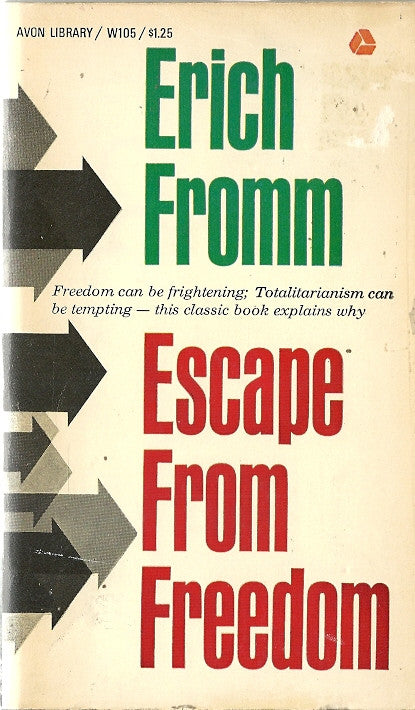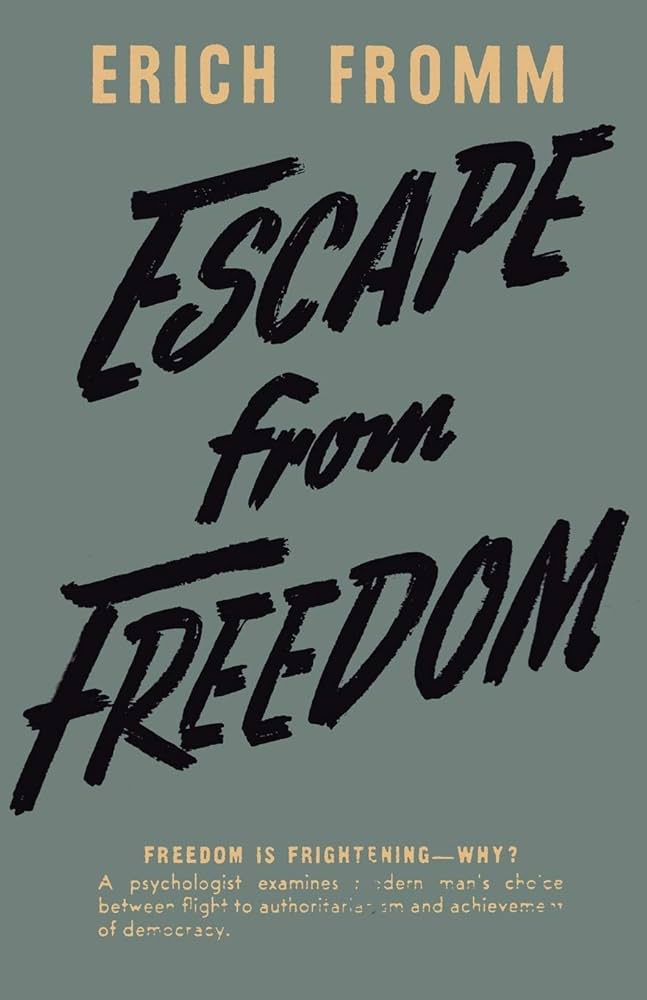Escape from Freedom - Erich Fromm

Escape from Freedom," published in 1941, is one of Erich Fromm's most influential and groundbreaking works. In this book, Fromm explores the psychological and social consequences of living in a modern capitalist society, particularly in the context of the rise of fascism and authoritarian regimes in Europe during the 1930s.
Here are key aspects of "Escape from Freedom":
- Analysis of Freedom and Individualism:
Fromm begins by examining the concept of freedom, arguing that while freedom is a fundamental human desire, it can also be a source of anxiety. He explores the idea that individuals, when faced with the responsibility and choices that come with freedom, may experience a sense of isolation and insecurity.
- The Rise of Authoritarianism:
Fromm investigates how individuals, in their quest to escape the anxieties of freedom, may be drawn to authoritarian systems. He explores the psychological mechanisms that lead people to surrender their individuality and autonomy in exchange for the perceived security and certainty offered by authoritarian leaders and structures.
- Social and Economic Factors:
Fromm connects the desire for escape to broader social and economic conditions. He argues that the alienation and dislocation experienced by individuals in modern capitalist societies contribute to a longing for a sense of belonging and a willingness to conform to authoritarian ideologies.
- Mechanisms of Escape:
The book examines various mechanisms people employ to escape from the burden of freedom. Fromm identifies conformity, destructiveness, and automaton conformity as ways individuals may relinquish their autonomy and embrace submission to external authorities.
- Psychological Roots of Authoritarianism:
Fromm delves into the psychological roots of authoritarianism, exploring the role of fear, the desire for power, and the need for a sense of belonging in shaping individuals' attitudes toward authority. He also discusses the impact of early socialization and the family on the development of authoritarian tendencies.
- Humanistic Alternative:
While critiquing the negative aspects of authoritarianism and escape mechanisms, Fromm proposes a humanistic alternative. He advocates for the development of a positive freedom characterized by genuine self-awareness, responsibility, and the ability to relate authentically to oneself and others.
"Escape from Freedom" remains relevant today for its insightful analysis of the human psyche, the impact of social and economic structures on individual well-being, and the allure of authoritarianism in times of uncertainty. The book has been praised for its interdisciplinary approach, combining psychology, sociology, and political theory to provide a comprehensive understanding of the complex relationship between the individual and society.
I highly recommend you to watch the of Escape from Freedom book analysis those who are interested in;
Erich Fromm's Escape from Freedom Book analysis;
References;
- Funk, Rainer (2000). Erich Fromm: His Life and Idea. New York: Continuum. pp. 169, 173. ISBN 0-8264-1224-6.
Thank you for reading, hope you like it!
You can complete great comment tasks at here. #erichfromm #escapefromfreedom #book #psychology #reading #bookanalysis #writer









































